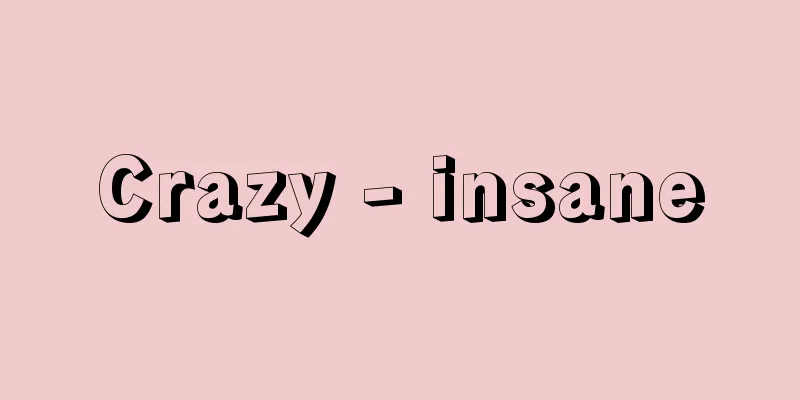Crazy - insane

|
It is a slang term for mental illness and mentally ill people that has been widely used in Japan since the early modern period, and the word (Qichigai) was already included in the Japanese-Portuguese Dictionary published in 1603 (Keicho 8). The original meaning is said to be not simply "going crazy" but "exchanging one's mind for another's." Incidentally, in the Middle Ages, "monotsuki" and "monogurui" were widely used to refer to mental illness in general, and in ancient times "tabure" was widely used, so there is no doubt that the lineage of "tabure" → "monotsuki" or "monogurui" → "kichigai" has historically conveyed the Japanese view of insanity. Source: Heibonsha World Encyclopedia, 2nd Edition Information |
|
日本で近世以降ひろく使われてきた精神病,精神病者の俗称で,1603年(慶長8)刊行の《日葡辞書》にはすでにこの語(Qichigai)が収録されている。原義は,単に〈気が変になること〉ではなく,〈自分の気がほかの気と入れかわること〉であるとされる。ちなみに,中世では〈ものつき〉や〈ものぐるい〉が,そして古代では〈たぶれ〉が精神病一般を指す言葉として流布しており,したがって〈たぶれ〉→〈ものつき〉ないし〈ものぐるい〉→〈気ちがい〉といった系譜が日本人の狂気観を歴史的に伝えてきたことはまちがいない。
出典 株式会社平凡社世界大百科事典 第2版について 情報 |
Recommend
Salt City - Ento
…Fushun County was established in the Song Dynast...
Upside-down frogs - upside-down frogs
…The larvae usually metamorphose within 2–3 month...
Pine spirit - Shoi
Date of birth and death unknown. A haiku poet in ...
Ohataki
...A food made by soaking raw rice in water to so...
Bagaudai (English spelling) [Latin]
Originally a Celtic word meaning "fighter&quo...
Woodworking tool - Mokkougu (English)
Tools for processing wood. In Japan, most building...
oneiroider Zustand (English spelling) oneiroider Zustand
...In Japan, the following three different states...
Blue sclera (English spelling) bluesclera
…When the sclera is thin and weak due to a congen...
Anolis equestris (English name) Anolisequestris
… [Takahiro Matsui]. … *Some of the terminology t...
Saris, John
Born: 1579/1580, London [Died] December 11, 1643. ...
Nakatomi no Omimaro
Year of death: Wadō 4, leap year 6, 22 (August 10,...
Mitsuharu Inoue
Novelist. Born in Port Arthur (now Dalian, China)...
Justification - ginin (English spelling) justificatio
In Christian theology, it refers to God's act ...
gnōsis (English spelling) gnosis
…a religious and ideological movement that arose ...
Statue of the monk Ganjin
This is a representative dry lacquer sculpture of ...









